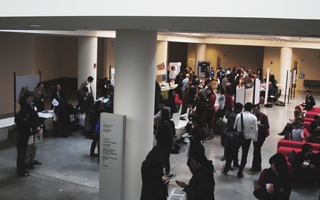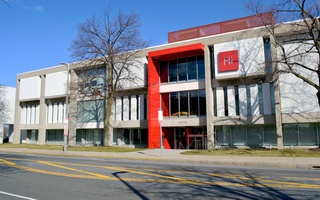Twenty-three student startup finalists gathered Thursday night to present their projects at the showcase of the i3 Harvard College Innovation Challenge. The showcase was followed by an awards ceremony announcing the prize winners.
Award recipients included Senju and Elfakhani, who won the Public Sector Innovation Award for $10,000 from Accenture, a multinational management consulting company.
Adrian W. Jones ’16, Aaron Perez ’15, Michael Perez, and Rishav Mukherji ’15 won $10,000 through the McKinley Family Grant for Innovation and Entrepreneurship in Social Enterprise. The group’s startup, NutraRide, aims to provide data visualization for the origin and production of food.
Francis K. Masuda ’15, Conner R. Dalton ’15, and Ryan D. Grossman ’15 also won $10,000 through the McKinley Family Grant for Innovation and Entrepreneurship in Commercial Enterprise. The group designed an app called Ivory, which provides digital tools to help learn sheet music.
Jason D. D. Smith ’15 and Trevor R. Nash ’15 built Rayger Lights, a startup that creates consumer lights for lightshows that respond to music frequencies. They built their first prototype lightshow as a class project for an introduction to electrical engineering course.
Smith and Nash’s project Rayger Lights won the Technology and Entrepreneurship Center at Harvard Prize for $5,000.
Participants also pointed to the educational value of doing the challenge, even if they did not secure funding.
Florencia Leyson, co-founder of Meri Library and a student at the Harvard Kennedy School of Government, said that the competition gave her experience in entrepreneurship.
“We felt it was a great opportunity to receive some feedback for our idea,” she said. “This is something new to us; we’re not entrepreneurs.”
Leyson’s startup was originally a class project at the Kennedy School. Leyson and her classmate Kate W. Sturla decided to turn their class project into a potential startup.
Smith also pointed out the value of the process.
“Pitching to investors is a critical skill for startups, and it is something you will have to continually do, so being able to do that in a kind of lower-risk environment is really advantageous,” he said.
Other projects ranged from mobile phone applications for finding tutors to vegan baked goods.
Hikari Senju ’15 and Mazen Elfakhani, a teaching fellow in the Sociology Department, designed an app called QuickHelp, which enables students and tutors to find each other and arrange one-on-one tutoring sessions.
Nina Hooper ’16 and Alice Han ’16 worked on a projected called Feel Good Cake, a series of vegan baked goods produced using nutrient-rich ingredients that are both gluten and refined sugar-free.
Read more in College News
Phi Beta Kappa Elects 'Junior 24' for Class of 2016Recommended Articles
-
 Innovation Summit Encourages Social Entrepreneurship
Innovation Summit Encourages Social Entrepreneurship -
 Harvard’s Life Lab Gets Green Light from BRA
Harvard’s Life Lab Gets Green Light from BRA -
Innovation Challenge Awards Funds to Social Enterprise Start-UpsOver $300,000 in prize money was awarded to seven winners of the President’s Innovation Challenge Award Ceremony at the iLab in Allston on Tuesday afternoon.
-
 I-Lab Looks to Expand Management Team
I-Lab Looks to Expand Management Team -
 Lemann Donates to Engineering and Entrepreneurship Programs
Lemann Donates to Engineering and Entrepreneurship Programs













